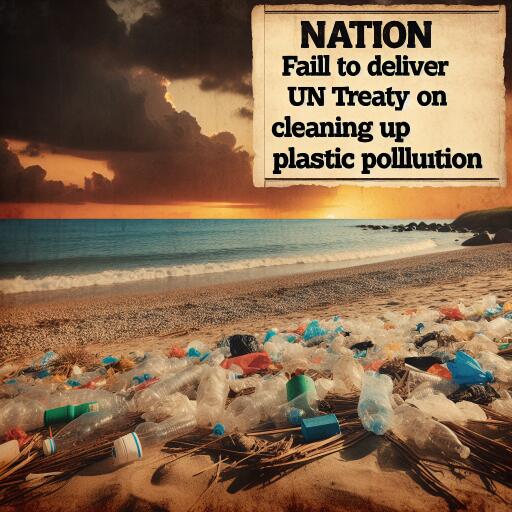
Nations Stalled in Efforts to Address Global Plastic Pollution
Negotiators from around the globe have concluded another round of discussions aimed at curbing the rampant issue of plastic pollution without reaching a binding agreement. Despite extensive and intense meetings in South Korea, various delegates left the table without consensus, delaying impactful decisions until at least next year.
The complexity of forming a binding treaty on plastics, a material essential to a multi-billion dollar global market yet detrimental to the environment, became evident as the week-long talks at the Busan Exhibition and Convention Center concluded. Representatives from numerous nations, as well as key industry stakeholders, closely monitored the proceedings, emphasizing the challenges faced in reducing plastic production worldwide.
Erin Silsbe, leading the Canadian delegation, encapsulated the urgency needed in subsequent discussions. She emphasized that the planet can no longer endure the environmental degradation posed by plastics. The statistics highlight the severity of the problem: annually, global production exceeds 450 million metric tons, predominantly derived from fossil fuels, with around 350 million metric tons translating into waste. The OECD reports that half of this waste ends up in landfills, 19 percent is incinerated, and only a fraction, less than 10 percent, is recycled. Mismanaged waste often finds its way into natural water bodies, exacerbating pollution concerns.
A coalition of over sixty countries, supported by environmental organizations, advocated for a comprehensive treaty to reduce plastic production, curb the use of harmful chemicals, and establish significant enforcement mechanisms. However, their vision met resistance. Panama’s envoy, Juan Carlos Monterrey Gómez, viewed the discussions as a “moral failure” due to the lack of commitment to stringent regulations, despite backing from around 120 nations.
Opposing voices, including Russia and Saudi Arabia, alongside industry proponents like the American Chemistry Council, pushed for a less restrictive, voluntary treaty emphasizing waste management. As highlighted by Abdulrahman Al Gwaiz from Saudi Arabia, the focus should remain on managing waste efficiently rather than limiting plastic production outright, pointing to technological solutions as historical problem solvers.
While the South Korean Foreign Minister, Cho Tae-yul, expressed optimism in reconvening for further negotiations, delegates from various nations highlighted the economic implications of limiting plastic, particularly those from oil-producing and developing regions. The discussion surrounding economic development versus environmental responsibility remains a central theme.
The complexity of global negotiations on plastics is not new. Since the UN Environment Assembly’s declaration in 2022 to forge a binding treaty by 2024, attempts have been made to address the crisis. However, ideological divides between nations continue to pose substantial barriers.
Despite the setback, those striving for significant policy changes remain hopeful. The latest draft treaty, reduced to 22 pages from an initial 73, serves as a potential framework for future negotiations. Environmental advocates stress the vital need for a treaty that not only targets mismanaged waste but also integrates broader environmental and health protections.
The discord in Busan emphasized the necessity for a consolidated global effort against plastic pollution. The discussions reflect an understanding of the gravity of this environmental concern, yet highlight divergent paths on how best to address it. As negotiations persist, the opportunity still looms on the horizon for an agreement that could protect both biodiversity and the planetary climate.





Leave a Reply